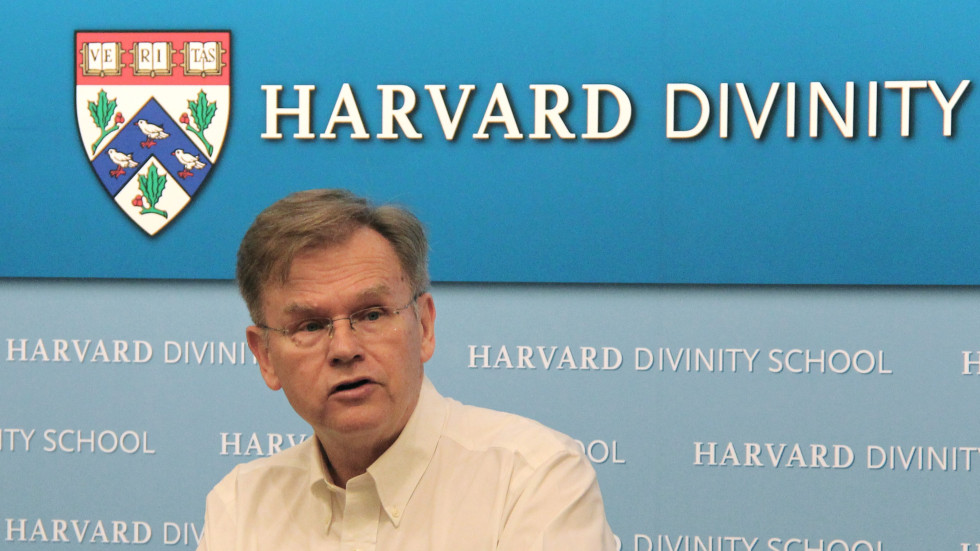Late this spring, Harvard Professor Dr. Mark Jordan met with a group of queer seminary students at the School of Theology. The conversation was about queer theology and sexual ethics.
At the Harvard School of Divinity, Jordan is a scholar of Christian theology, European philosophy, and gender studies. He also writes extensively on gender sexuality and the relationship between religious doctrine and LGBTQ+ issues. The discussion, held via Zoom, was born of a mutual desire to create and inhabit safe space—the students' desire to openly address topics in queer theology as well as Jordan’s desire to enable an environment for sharing and exchange. The session brought together members of the student body from across the LGBTQ+ spectrum to consider the importance of queer theology, its development, and how it might continue to shape and support Christian communities.
The word “queer” is often used as an umbrella term to describe the sexual orientations, gender identities, and communities of those who identify on the LGBTQ+ spectrum, but the “queer” in “queer theology” can be more than just a descriptive label.
“The future of queer theology, or even the need for a queer theology, is an aching question,” said Jordan, noting that the intellectual arguments for tolerance and affirmation of queer people in Christian spaces have been written about for decades.

“The arguments we use, for instance, about so-called condemnations in scripture, are arguments that go back to the 1950s,” he said. Because that interpretive work has largely been done, Jordan’s interest stretches beyond apologetics to seek a wider exploration of what it means theologically to be queer. For Jordan, that future includes forms of thinking and knowing different from the prevailing forms used by cultures that want to banish queer perspectives.
“Queer forms of art, or queer forms of living, or queer forms of thinking can be used to ‘queer,’ that is to crack, to break open, the other forms of knowing,” Jordan said. In this sense, queerness is a form of critique that can be used to discover alternate language, art, and history from queer perspectives.
Exploring those perspectives is perhaps more important now than ever before. According to a February 2022 Gallup poll, 7.1 percent of U.S. adults self-identify as lesbian, gay, bisexual, transgender or something other than heterosexual. That number, double what it was a decade ago, represents a record high due mostly to the 21 percent of Generation Z that identifies as LGBTQ. By comparison, 10.5 percent of millennials say they are LGBTQ, as well as 4.2 percent of Generation X, 2.6 percent of Baby Boomers, and 0.8 percent of people born before 1946.
As a culture of affirmation continues to grow, both inside and outside of the church, conversations that offer intentional time and space for queer-identifying Christians to explore issues that affect queer communities will continue to be crucial for theological development, and for recognizing the diversity of queer thought.
“Thanks to our gathering, I got to experience different perspectives that exist within the queer community at large, and within the queer community at Sewanee,” said Lucas Crossland, a middler at the School of Theology. “Having space to discuss experiences and issues that others understand without explanation, and being open and vulnerable with each other, was the highlight of the week for me. I’m still mentally chewing on that discussion.”
“Dr. Jordan made space for everyone to voice their opinion, and it was refreshing not to feel like an authority figure was talking over us or trying to change our perception of our own lived experiences,” said middler Sam Haisten.
Conversations that encourage queer Christians to share their experiences of feeling in or out of place in Christian community can also continue to help participants explore how queer identity might impact liturgical practice, spirituality, and sexual ethics in religious community.
“The time with Dr. Jordan was really wonderful because it’s clear he’s spent so long thinking of what queer people bring to the body of Christ,” said junior Nathan Self. “It can so often feel like, now that the church ‘accepts’ LGBT people, that we’re meant to just blend in, or that there’s not really a path marked for how our life experience makes us unique. I want to know what a queer spirituality and call might look like, and he gave us some wisdom for the journey.”
Jordan will return to Sewanee this fall to give the School of Theology’s annual Alumni Lectures. “I’m looking forward to the opportunity to speak with him again as I continue to develop my own theology of queerness and what it means to be queer in the Church,” said Haisten.
As a scholar of Christian theology and gender studies, Jordan has taught and written extensively on Christian sexual ethics. His most recent book latest book, Transforming Fire (Eerdmans 2021), tells a brief history of the imagined scenes of theological education, and he is currently working on another manuscript about the neglected languages of queer spirituality. He is a Fellow of the American Academy of Arts and Sciences.
Jordan to Lecture at the School of Theology Sept. 27-29, 2022
As part of a two-day Alumni Lectures & Homecoming event, Dr. Mark Jordan will hold a series of three lectures. All are welcome to register for the 2022 Alumni Lecture & Homecoming event festivities, which will be held on the campus of the University of the South. Read more and register here. Registration for the live-stream of Mark Jordan’s lectures will be available shortly.
